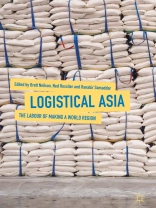This book explores how the management science of logistics changes working lives and contributes to the making of world regions. With a focus on the port of Kolkata and changing patterns of Asian regionalism, the volume examines how logistics entwine with political power, historical forces, labour movements, and new technologies. The contributors ask how logistical practices reconfigure both Asia’s relation to the world and its internal logic of transport and communication. Building on critical perspectives that understand logistics as a political technology for producing and organizing space and power, Logistical Asia tracks how digital technologies and material infrastructure combine to remake urban and regional territories and produce new forms of governance and subjectivity.
Table of Content
1. Making Logistical Worlds.- Part I Port as Infrastructure of Postcolonial Capitalism.- 2. The Port of Calcutta in the Imperial Network of South and South-East Asia, 1870s-1950s.- 3. Spatialization of Calculability, Financialization of Space: A Study of the Kolkata Port.- 4. Ports and Crime.- 5. Haldia: Logistics and Its Other(s).- 6. Kolkata Port: Challenges of Geopolitics and Globalization.- Part II Logistics of Asia-Led Globalization.- 7. The Importance of Being Siliguri: Border Effect and the ‘Untimely’ City in North Bengal.- 8. Piraeus Port as a Machinic Assemblage: Labour, Precarity and Struggles.- 9. Asia’s Era of Infrastructure and the Politics of Corridors: Decoding the Language of Logistical Governance.- 10. Logistics of the Accident: E-waste Management in Hong Kong.- 11. Geopolitics of the Belt and Road: Space, State, and Capital in China and Pakistan.- 12. Becoming Immaterial Labour: The Case of Macau’s Internet Users.- 13. Follow the Software: Reflections on the Logistical Worlds Project.
About the author
Brett Neilson is Professor at the Institute for Culture and Society at Western Sydney University. With Sandro Mezzadra, he is author of Border as Method, or, the Multiplication of Labor (2013). With Ned Rossiter, he has coordinated the project Logistical Worlds: Infrastructure, Software, Labour.
Ned Rossiter is Professor of Communication with a joint appointment in the Institute for Culture and Society and the School of Humanities and Communication Arts at Western Sydney University. His most recent book is Infrastructure, Software, Labor: A Media Theory of Logistical Nightmares (2016).
Ranabir Samaddar is Distinguished Chair in Migration and Forced Migration Studies at the Calcutta Research Group. His research focuses on migration and refugee studies, nationalism and post-colonial statehood, and new regimes of technological restructuring and labour control. His most recent book is Karl Marx and the Postcolonial Age (2017).












